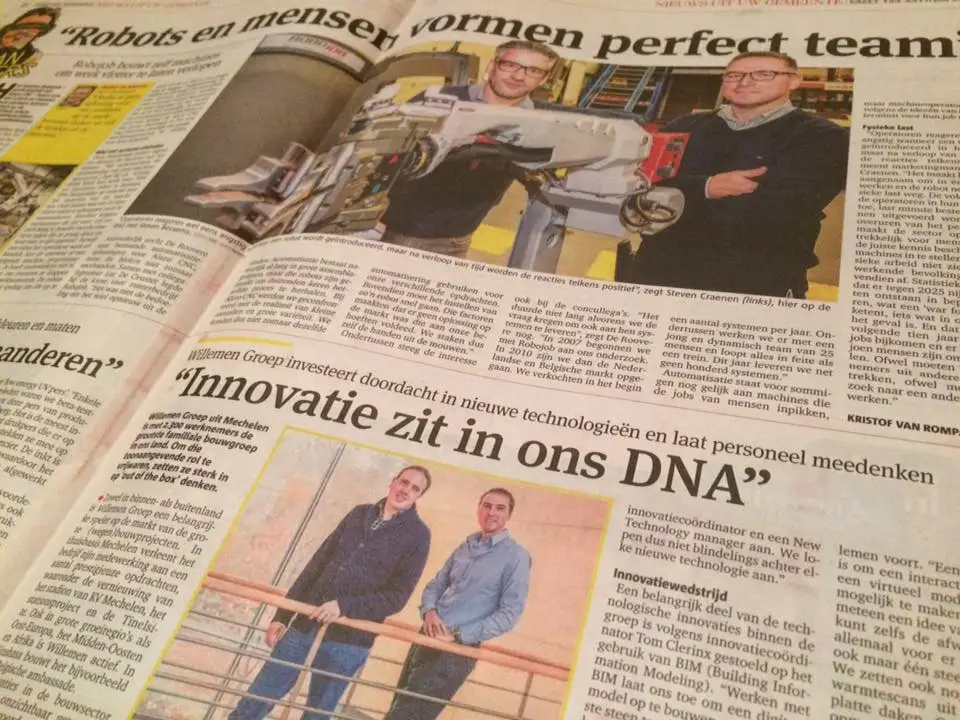RoboJob celebrates its tenth anniversary next year, but the company has a long history. Frans De Roovere, once Managing Director at Reynaers Aluminum from Duffel, started with Aluro at the end of the 1960s. Throughout the years, the number of the company’s activities grew and several businesses were formed. One of these is Aluro CNC, which specializes in computer-controlled manufacture of mechanical components, the so-called machining industry. In turn, they deliver to many producers. “For a supplier like Aluro CNC, the high wage costs in our country are a problem, especially if you consider that we are competing in an international market with countries such as Poland, Romania and Bulgaria”, explains director Steven Bessems. "In addition, orders are becoming more and more "just in time” and in smaller batch sizes: customers no longer take 1,000 pieces, just to put 980 into a warehouse. Today, people order 20 pieces, which have to be delivered quickly because stocks are deemed to be dead capital and must be avoided as much as possible. For a company like Aluro CNC, the variation in components to be produced is therefore large. In addition, it’s also extremely difficult to find good machine operators for this industry.
These phenomena set engineer Helmut De Roovere thinking. “We researched how our machine operators spent their time”, he explained. "Ultimately, their work was found to consist 70 percent of repetitive tasks. They spent thirty percent of their time on creatively setting up the machines. Our mission was to remove the repetitive tasks and to automate them. This again gives employees time to engage in the creative tasks that they like to do and for which they are trained. While a robot handles the loading and unloading work of the machines, the operator can already program the next machine. Moreover, you don’t need to ask employees to put in a lot of overtime during peak times. The robots allow you more latitude to meet these.”
Initially, De Roovere sought existing automation solutions for Aluro CNC but they didn’t appear to be available. Together with colleague engineer Luc De Ceuster, he sowed the seeds for sister company RoboJob. “It wasn’t the intention to re-invent the wheel. Automation, of course, has long been in large assembly lines. But these robots are made to repeat the same process thousands of times. At Aluro CNC we were confronted with the reality of small numbers and large varieties. So we couldn’t just use the same automation for our various assignments. Furthermore, the setting up of such a robot has to be fast. Those factors meant that there was no solution on the market that met our needs. So we rolled up our own sleeves and set to work.”
Meanwhile, the interest also increased with competitive colleagues. “It didn’t take long before we were asked to also provide systems to them", De Roovere continues. "In 2007, we started our research with RoboJob. In 2010 we went to the Dutch and Belgian markets. We initially sold a number of systems a year. Meanwhile we’re working with a young and dynamic team of 25 people, and everything’s running like clockwork. This year we’ll deliver nearly a hundred systems"
For some, automation is equal to machines that steal people’s jobs, but according to RoboJob, the last thing that machine operators should do is to fear for their jobs. “Operators react anxiously when a robot is introduced into their business, but over time, the responses are always positive ‘, said Marketing manager Steven Craenen. “In return it makes it fun to work in a workshop and it takes a lot of physical burden away. The satisfaction of the operators in their work increases, last minute orders can be done without overtime of the personnel. It makes the sector attractive again to people who have the right knowhow to set up the machines, but who’ve had enough of the physical work. Moreover, the working population is decreasing. Statistics show that by 2025 there will be acute shortages in certain sectors, which will trigger a "war for talent", something that is already the case in our industry. And that there will be an additional 3.5 million jobs over the next ten years, but only 1.4 million people to fill these. Either we need to attract employees from other countries or we need to look for another way of working."
